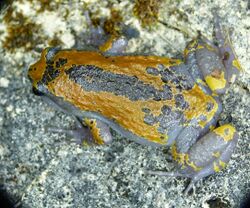Biology:Uperodon triangularis
From HandWiki
Short description: Species of amphibian
| Uperodon triangularis | |
|---|---|

| |
| Scientific classification | |
| Domain: | Eukaryota |
| Kingdom: | Animalia |
| Phylum: | Chordata |
| Class: | Amphibia |
| Order: | Anura |
| Family: | Microhylidae |
| Genus: | Uperodon |
| Species: | U. triangularis
|
| Binomial name | |
| Uperodon triangularis (Günther, 1876)
| |
| Synonyms[2] | |
| |
Uperodon triangularis is a species of narrow-mouthed frog (family Microhylidae) found in southwestern India .[2] They are endemic to the Western Ghats, where they are known to breed in water collected in tree hollows.[3] The advertisement calls of males is made up of about 30 pulses of 0.38 second duration with a frequency range of 0.6 and 1.1 kHz. These are emitted every three seconds.[4]
References
- ↑ Biju, S.D.; Dasaramji Buddhe, G.; Dutta, S.; Vasudevan, K.; Srinivasulu, C.; Vijayakumar, S.P. (2016). "Uperodon triangularis". IUCN Red List of Threatened Species 2016: e.T57991A91632460. doi:10.2305/IUCN.UK.2016-1.RLTS.T57991A91632460.en. https://www.iucnredlist.org/species/57991/91632460. Retrieved 19 November 2021.
- ↑ 2.0 2.1 Frost, Darrel R. (2019). "Uperodon triangularis (Günther, 1876)". Amphibian Species of the World: an Online Reference. Version 6.0. American Museum of Natural History. http://research.amnh.org/vz/herpetology/amphibia/Amphibia/Anura/Microhylidae/Microhylinae/Uperodon/Uperodon-triangularis.
- ↑ Inger, Robert F.; Shaffer, H.B.; Koshy, M.; Bakde, R. (1987). "Ecological structure of a herpetological assemblage in South India". Amphibia-Reptilia 8 (3): 189–202. doi:10.1163/156853887X00234.
- ↑ Kuramoto, Mitsuru; Dubois, Alain (2009). "Bioacoustic studies on three frog species from the Western Ghats, south India". Current Herpetology 28 (2): 65–70. doi:10.3105/018.028.0203.
Wikidata ☰ Q28016724 entry
 |


